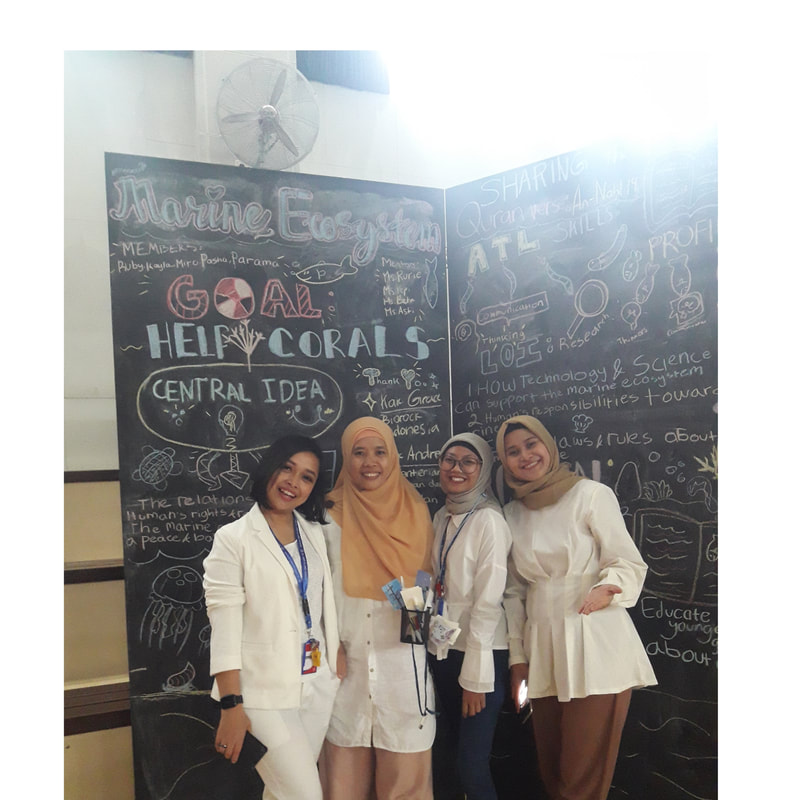STUDENTS:
MENTORS:
TRANS DICIPLINARY THEME
SHARING THE PLANET
CENTRAL IDEA
The relationship between marine life with human's rights and responsibilities in creating a peace and balanced interaction.
LINE OF INQUIRY
- How technology and science can support marine life to be balanced.
- Human's responsibility to their environment.
- Examine law and rules about marine life.
rELATED CONCEPT
- Balance
- Biodiversity
- Interdependence
key concept
- Causation
- Connection
- Responsibility
what are coral reefs?
Coral reefs are some of the most diverse ecosystems in the world, housing tens of thousands of marine species. About one-third of all marine fish species live part of their lives on coral reefs. A coral reef is an underwater ecosystem characterized by reef-building corals. Reefs are formed of colonies of coral polyps held together by calcium carbonate. Each individual coral is referred to as a polyp. Coral polyps live on the calcium carbonate exoskeletons of their ancestors, adding their own exoskeleton to the existing coral structure. As the centuries pass, the coral reef gradually grows, one tiny exoskeleton at a time, until they become massive features of the marine environment.
Corals are found all over the world's oceans, coral reefs only occupy 0.1% of the area of the ocean but they support 25% of all marine species on the planet. Hundreds of millions of people rely on coral reefs for essential nutrition, livelihoods, protection from life-threatening storms and crucial economic opportunity. Indonesia is part of the Coral Triangle, a region that contains the highest diversity of marine life in the world. More people live close to reefs in Indonesia than anywhere else on the planet. Indonesia’s coral reefs face significant global and local threats including climate change, overfishing, destructive fishing and water pollution from coastal development. About half the world’s shallow water coral reefs are already gone, and without urgent action to address climate change, pollution, overfishing and destructive coastal development, these life-sustaining natural wonders could all but disappear.
step 1
identify globally significant issues
EXPLORING, WONDERING, AND QUESTIONING
We start the first week by identifying issues by having prior knowledge related to central idea that the learners have been discussed in their class.
We start the first week by identifying issues by having prior knowledge related to central idea that the learners have been discussed in their class.
step 2
determining timing and time frame
MAKING CONNECTIONS BETWEEN PREVIOUS LEARNING AND CURRENT LEARNING
Parents Meeting on Wednesday 6th February, 2019
step 3
engaging support from the learning community
COLLECTING DATA AND REPORTING FINDINGS OR RESEARCHING AND SEEKING INFORMATION
On wednesday February 27th, 2019, we visited Muara Angke to interviewed and survey fisherman, local people and visitor. We took sample of sea water.
We also visited Ancol Beach and took sample of sea water of Ancol and get clean sea water. We Collaborate with our parents and get sample of Kuta Beach water.
On Thursday February 28th, 2019, we had guest speaker from BioRock Indonesia.
STEP 4
ORGANIZING THE LEARNING
EXPERIMENTING AND PLAYING WITH POSSIBILITIES SOLVING PROBLEMS IN A VARIETY OF WAYS
"Why do corals have an ideals pH level?"
"When did corals start decreasing?"
"Is there a way to change the pH level?"
"When did corals start decreasing?"
"Is there a way to change the pH level?"
On wednesday March 6th, 2019, we did experiment to determine pH level of sample that we took. Our hypotesis is we think that the pH level will be ideal for corals.
On Tuesday March 19th, 2019, we visited Kementrian Kelautan dan Perikanan Office in North Jakarta (Bapak Andreas) to get information about goverment law and rules.
On Thursday March 20th, 2019, we visited Marine Heritage Gallery Jakarta (MHG).
STEP 5
MONITORING THE EXHIBITION
ESTABLISHING AND TESTING THEORIES
action
We did Beach Cleaning to support the Marine ecosystem in Muara Angke. We did campaign by sharing to the school community about corals reef through story telling with the handmade comic.
STEP 6
SHARING THE EXHIBITION
TAKING AND DEPENDING A POSITION








































